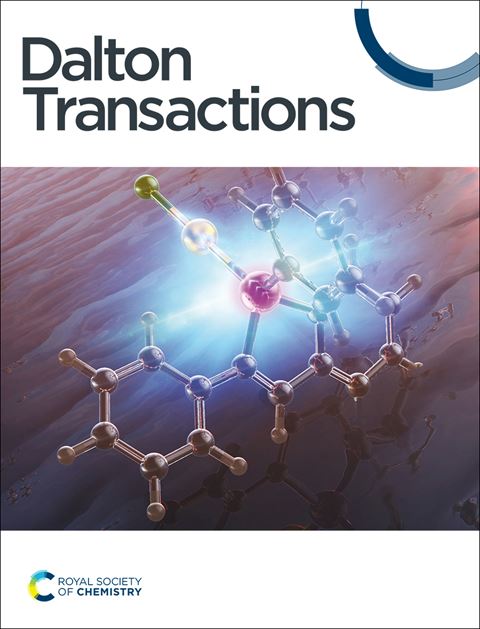用于甲醛乙炔化合成 1,4-丁炔二醇的 CuM/SiO2(M=Bi、Mg、Mn)催化剂的制备:CuO 和 Bi2O3 的正界面效应
IF 3.5
3区 化学
Q2 CHEMISTRY, INORGANIC & NUCLEAR
引用次数: 0
摘要
铜基催化剂催化的甲醛乙炔化反应是与高附加值化学品相关的 1,4-丁炔二醇的重要合成方法。本研究采用沉积-沉淀法制备了一系列 CuM/SiO2 催化剂(M=Bi、Mg、Mn),并将其应用于乙炔化反应。研究了不同促进剂(Bi、Mg、Mn)对催化活性的影响。利用 XRD、TEM、SEM 图谱、N2 低温吸附/解吸、FT-IR、XPS 和 TG-DTA 表征分析系统地研究了催化剂结构与性能之间的关系。结果表明,在乙炔化反应 7 小时后,30Cu2Bi/SiO2 表现出最高的 1,4-丁炔二醇产率(70%)和选择性(97%)。此外,与商用催化剂相比,30Cu2Bi/SiO2 具有相似的循环稳定性,在 8 次约 60 小时的反应后,1,4-丁炔二醇的产率为 47%,选择性为 98%。此外,30Cu2Bi/SiO2 中存在的 Cu-Bi 界面在稳定亚铜方面起着重要作用,不会过度还原成金属铜。因此,在乙炔化反应过程中,30Cu2Bi/SiO2 具有最活跃的 Cu2C2 和最少的聚乙炔副产物。此外,30Cu2Bi/SiO2 中产生的最丰富的氧空位也有助于甲醛的乙炔化反应。本文章由计算机程序翻译,如有差异,请以英文原文为准。
The preparation of CuM/SiO2 (M=Bi, Mg, Mn) catalysts applied in ethynylation of formaldehyde for 1,4‑butynediol synthesis: the positive interface effect of CuO and Bi2O3
The ethynylation of formaldehyde reaction catalyzed by Cu-based catalysts is an important synthesis method for 1,4-butynediol relating to high value-added chemicals. In this work, a series of CuM/SiO2 ( M=Bi, Mg, Mn ) catalysts were prepared by a deposition-precipitation method and applied in the ethynylation reaction. The effects of different promoters ( Bi, Mg, Mn ) on the catalytic activity were investigated. The relationship between catalyst structure and performance is systematically studied using XRD, TEM, SEM mapping, N2 low- temperature adsorption/desorption, FT-IR, XPS, and TG-DTA characterization analysis. The results show that 30Cu2Bi/SiO2 exhibits the highest 1,4-butynediol yield (70%) and selectivity (97%) after the ethynylation reaction for 7 h. Furthermore, compared with the commercial catalyst, 30Cu2Bi/SiO2 shows similar cyclic stability, 47% yield, and 98% selectivity for 1,4-butynediol after 8 times about 60 h. It is attributed that small CuO particles are uniformly dispersed in 30Cu2Bi/SiO2 with the biggest specific surface area (446.37 m2/g). What’s more, the Cu-Bi interface existing in 30Cu2Bi/SiO2 plays an important role in stabilizing cuprous, not excessively reduced to metallic Cu. Therefore, during the ethynylation reaction, 30Cu2Bi/SiO2 has the most active Cu2C2 and the least polyacetylene by-products. In addition, the richest oxygen vacancies arose in 30Cu2Bi/SiO2 also contribute to the ethynylation of the formaldehyde reaction.
求助全文
通过发布文献求助,成功后即可免费获取论文全文。
去求助
来源期刊

Dalton Transactions
化学-无机化学与核化学
CiteScore
6.60
自引率
7.50%
发文量
1832
审稿时长
1.5 months
期刊介绍:
Dalton Transactions is a journal for all areas of inorganic chemistry, which encompasses the organometallic, bioinorganic and materials chemistry of the elements, with applications including synthesis, catalysis, energy conversion/storage, electrical devices and medicine. Dalton Transactions welcomes high-quality, original submissions in all of these areas and more, where the advancement of knowledge in inorganic chemistry is significant.
 求助内容:
求助内容: 应助结果提醒方式:
应助结果提醒方式:


